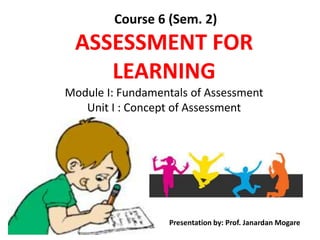Meaning, nature and functions of assessment
•Transferir como PPTX, PDF•
74 gostaram•88,277 visualizações
Very Useful for B. Ed. Students. As per new syllabus.
Denunciar
Compartilhar
Denunciar
Compartilhar

Recomendados
Recomendados
Mais conteúdo relacionado
Mais procurados
Mais procurados (20)
Types of test items and principles for constructing test items 

Types of test items and principles for constructing test items
Destaque
Destaque (6)
Semelhante a Meaning, nature and functions of assessment
Semelhante a Meaning, nature and functions of assessment (20)
Assessment for learning chapter 1 - copy-converted

Assessment for learning chapter 1 - copy-converted
assessmentforlearningchapter-1-copy-converted-200124131944.pptx

assessmentforlearningchapter-1-copy-converted-200124131944.pptx
Unit 1.Introduction of Assessment in Education.pptx

Unit 1.Introduction of Assessment in Education.pptx
Assessment For Learning -Second Year -Study Material TAMIL NADU TEACHERS EDUC...

Assessment For Learning -Second Year -Study Material TAMIL NADU TEACHERS EDUC...
Note on Evaluation and Assessment in Nursing Education (Part - 01)

Note on Evaluation and Assessment in Nursing Education (Part - 01)
K to 12 Grading Sheet Deped Order No. 8 S. 2015 PPT presentation

K to 12 Grading Sheet Deped Order No. 8 S. 2015 PPT presentation
Último
Making communications land - Are they received and understood as intended? webinar
Thursday 2 May 2024
A joint webinar created by the APM Enabling Change and APM People Interest Networks, this is the third of our three part series on Making Communications Land.
presented by
Ian Cribbes, Director, IMC&T Ltd
@cribbesheet
The link to the write up page and resources of this webinar:
https://www.apm.org.uk/news/making-communications-land-are-they-received-and-understood-as-intended-webinar/
Content description:
How do we ensure that what we have communicated was received and understood as we intended and how do we course correct if it has not.Making communications land - Are they received and understood as intended? we...

Making communications land - Are they received and understood as intended? we...Association for Project Management
https://app.box.com/s/7hlvjxjalkrik7fb082xx3jk7xd7liz3TỔNG ÔN TẬP THI VÀO LỚP 10 MÔN TIẾNG ANH NĂM HỌC 2023 - 2024 CÓ ĐÁP ÁN (NGỮ Â...

TỔNG ÔN TẬP THI VÀO LỚP 10 MÔN TIẾNG ANH NĂM HỌC 2023 - 2024 CÓ ĐÁP ÁN (NGỮ Â...Nguyen Thanh Tu Collection
Último (20)
Micro-Scholarship, What it is, How can it help me.pdf

Micro-Scholarship, What it is, How can it help me.pdf
Fostering Friendships - Enhancing Social Bonds in the Classroom

Fostering Friendships - Enhancing Social Bonds in the Classroom
On National Teacher Day, meet the 2024-25 Kenan Fellows

On National Teacher Day, meet the 2024-25 Kenan Fellows
HMCS Max Bernays Pre-Deployment Brief (May 2024).pptx

HMCS Max Bernays Pre-Deployment Brief (May 2024).pptx
ICT Role in 21st Century Education & its Challenges.pptx

ICT Role in 21st Century Education & its Challenges.pptx
Unit-V; Pricing (Pharma Marketing Management).pptx

Unit-V; Pricing (Pharma Marketing Management).pptx
Making communications land - Are they received and understood as intended? we...

Making communications land - Are they received and understood as intended? we...
TỔNG ÔN TẬP THI VÀO LỚP 10 MÔN TIẾNG ANH NĂM HỌC 2023 - 2024 CÓ ĐÁP ÁN (NGỮ Â...

TỔNG ÔN TẬP THI VÀO LỚP 10 MÔN TIẾNG ANH NĂM HỌC 2023 - 2024 CÓ ĐÁP ÁN (NGỮ Â...
Unit-IV; Professional Sales Representative (PSR).pptx

Unit-IV; Professional Sales Representative (PSR).pptx
Meaning, nature and functions of assessment
- 1. Course 6 (Sem. 2) ASSESSMENT FOR LEARNING Module I: Fundamentals of Assessment Unit I : Concept of Assessment Presentation by: Prof. Janardan Mogare
- 2. Meaning: Assessment is a process by which information is obtained relative to some known objective or goal. Assessment is a broad term that includes testing. A test is a special form of assessment. Tests are assessments made under contrived circumstances especially so that they may be administered. Assessment
- 3. In other words, all tests are assessments, but not all assessments are tests. We test at the end of a lesson or unit. We assess progress at the end of a school year through testing, and we assess verbal and quantitative skills Assessment
- 4. Definitions Allen (2004): Assessment involves the use of empirical data on student learning to refine programs and improve student learning. Huba and Freed (2000): Assessment is the process of gathering and discussing information from multiple and diverse sources in order to develop a deep understanding of what students know, understand, and can do with their knowledge as a result of their educational experiences; the process culminates when assessment results are used to improve subsequent learning.
- 5. Erwin (1991): Assessment is the systematic basis for making inferences about the learning and development of students. It is the process of defining, selecting, designing, collecting, analyzing, interpreting, and using information to increase students’ learning and development. Palomba and Banta (1999): Assessment is the systematic collection, review, and use of information about educational programs undertaken for the purpose of improving student learning and development.
- 6. Nature of assessment Assessment is embedded in the learning process. It is tightly interconnected with curriculum and instruction. As teachers and students work towards the achievement of curriculum outcomes, assessment plays a constant role in informing instruction, guiding the student’s next steps, and checking progress and achievement.
- 7. Nature of assessment Classroom assessment involves students and teachers in continuous monitoring of students’ learning. It gives students a measure of their progress as learners. It provides opportunity for close observation of students in the process of learning. It helps in collection of frequent feedback on students’ learning and how they respond to particular teaching approaches. Assessment has profound impact on the self- esteem of pupils, which is critical influence on learning. Uses variety of strategies.
- 8. Thus ‘assessment’ includes all those activities undertaken by teachers, and by their students in assessing themselves, which provide information to be used as feedback to modify the teaching and learning activities in which they are engaged.
- 9. Four fundamental elements of learner-centred assessment
- 10. • Monitoring the progress • Decision making • Screening • Diagnostic process • Placement of students in remedial courses Functions of assessment:
- 11. • Instructional planning • Evaluation of instructional programme. • Feedback • Motivation Functions of assessment:
